On November 4…
Beginning a one-week return of lessons for one “primary” reason – the results of presidential elections – although there certainly were other events that deserve your attention.
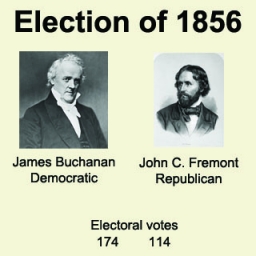
1856 – James Buchanan, who was at that time the U.S. ambassador to the United Kingdom, defeated John Fremont to become the 15th President of the United States.
Historians fault him for his failure to address the issue of slavery and the secession of the southern states, bringing the nation to the brink of civil war. His inability to address the sharply divided pro-slavery and anti-slavery partisans with a unifying principle has led to his consistent ranking by historians as one of the worst presidents in American history.
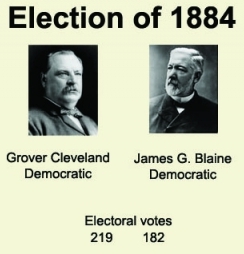
1884 – New York Governor Grover Cleveland defeated James Blaine – who was, despite what the photo above states, a Republican – in one of the closest electoral contests in history.
Cleveland barely managed to win his home state of New York, and with its 36 electoral votes, won the election 219-182.

1922 – British archaeologist Howard Carter and his workmen discovered a step leading to the tomb of King Tutankhamen in the Valley of the Kings in Egypt. Thus began a monumental excavation process in which Carter carefully explored the four-room tomb over several years, uncovering an incredible collection of several thousand objects.
The most splendid architectural find was a stone sarcophagus containing three coffins nested within each other. Inside the final coffin, which was made out of solid gold, was the mummy of the boy-king Tutankhamen, preserved for more than 3,000 years.
Most of these treasures are now housed in the Cairo Museum.
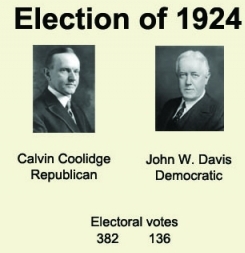
1924 – Calvin Coolidge, who had become president following the death of Warren G. Harding, easily won re-election by outdistancing his opponent, John W. Davis.
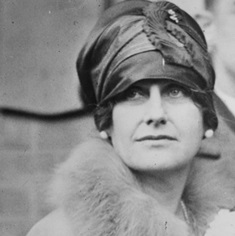
1924 – Nellie T. Ross of Wyoming, a Democrat and the widow of former Governor William Ross – who had served a year and a half before dying from complications from an appendectomy – was elected the nation’s first woman governor … and she won without campaigning.
One advantage Ross was seen to have was the desire of the citizens of Wyoming to be the first to elect a woman governor, after having been the first state to grant women the right to vote in 1869.
In 1933, Ross became the first female Director of the United States Mint, a position she held until her retirement in 1953.
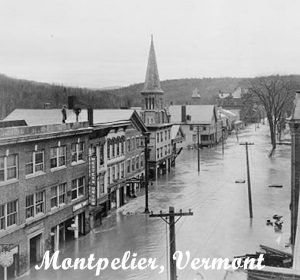
1927 – 10 days of extremely heavy rain in New England caused major flooding which went on to kill 200 people and cause millions of dollars in damages.
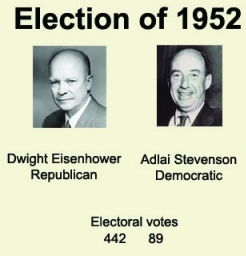
1952 – With the United States in the middle of the Korean War, and Cold War fears running deep throughout the land. Dwight D. Eisenhower, a World War II hero, won a sweeping victory over Democrat Adlai E. Stevenson to become the 34th president of the U.S.
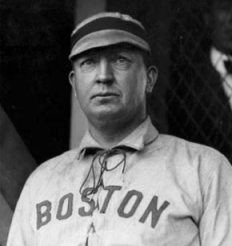
1955 – Baseball Hall of Fame Pitcher Cy Young died of natural causes at the age of 88. During his 21-year career, Young established numerous pitching records, some of which have stood for a century.
One of those records – 511 career wins – will never be broken. The Cy Young Award, which is presented to the best pitchers in both leagues each year, is named in his honor.
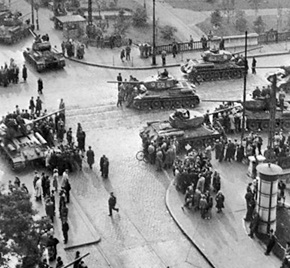
1956 – A spontaneous national uprising that had begun 12 days before in Hungary was viciously crushed by Soviet tanks and troops on this day.
The Soviet action stunned many people in the West. Soviet leader Nikita Khrushchev had pledged a retreat from the Stalinist policies and repression of the past, but the violent actions in Budapest suggested otherwise. An estimated 2,500 Hungarians died and 200,000 more fled as refugees.
Voice of America radio broadcasts and speeches by President Dwight Eisenhower and Secretary of State John Foster Dulles had recently suggested that the United States supported the “liberation” of “captive peoples” in communist nations.
Yet, as Soviet tanks bore down on the protesters, the United States did nothing beyond issuing public statements of sympathy for their plight.

1958 – Angelo Roncalli became Pope John XXIII. He was expected by many to be a caretaker and transitional pope, but he astonished the church and the world with his energy and reforming spirit. His convening of the Second Vatican Council and his changing of the church’s attitudes toward those who were not Catholic were milestones.
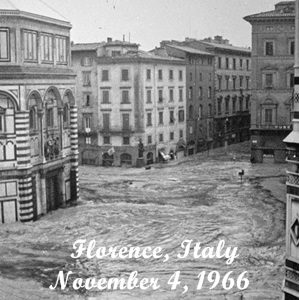
1966 – The Flood of the Arno River in Florence, Italy, killed hundreds of residents and left 5,000 families homeless. Approximately 600,000 tons of mud, rubble and sewage severely damaged or destroyed numerous collections of written work and fine art for which Florence is famous. In fact, it is estimated that between 3 and 4 million books/manuscripts were damaged, as well as 14,000 movable works of art.
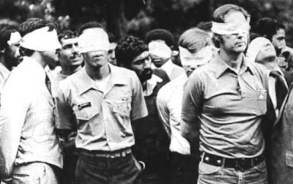
1979 – Hundreds of Iranian students stormed the U.S. Embassy in Tehran, taking more than 60 American hostages. The students, supporters of the conservative Muslim cleric Ayatollah Khomeini, were demanding the return of Iran’s deposed leader, the Shah Mohammed Reza Pahlevi, who had fled to Egypt in January 1979 and by November, was receiving cancer treatment in the U.S. After the student takeover, President Jimmy Carter ordered a complete embargo of Iranian oil.
The embargo only exacerbated an energy crisis that had been going on since the beginning of 1979. An Iranian oil-field strike and the January revolution had disrupted oil supplies from that part of the Middle East, and the Organization of Petroleum Exporting Countries (OPEC) cartel had announced a per-barrel fee increase that sent prices inching toward an all-time high.
By the time the students took over the Embassy in November, Americans were already dealing with the effects of this crisis: long lines and short tempers at gas pumps, panics over gasoline and heating oil shortages, and frustration with the inefficient, gas-guzzling vehicles manufactured by American automakers.
The hostage-takers, declaring their solidarity with other “oppressed minorities” and “the special place of women in Islam,” released 13 women and African Americans in the middle of November 1979. The remaining 52 hostages were held captive until January 1981, a total of 444 days of captivity.
The hostage crisis compounded the energy crisis, and, in fact, many historians believe that the combination of the two events cost President Carter the 1980 election.
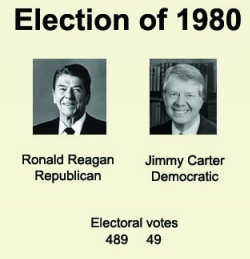
1980 –Republican Ronald Reagan defeated President Jimmy Carter in a landslide to become the 40th President of the U.S. Third-party candidate John Anderson, running as an Independent, won nearly six million votes, but giving all of those votes to Carter still wouldn’t have won him re-election.
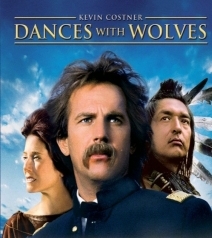
1990 – Dances With Wolves, a film about a Civil War-era soldier, premiered in Los Angeles.
The film starred Kevin Costner, who was also making his directorial debut. It was a surprise box-office success and earned 12 Academy Award nominations, winning seven, including Best Picture and Best Director.
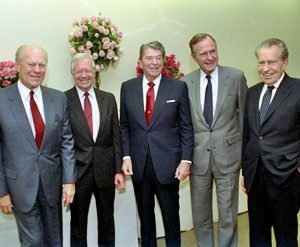
1991 – The Ronald Reagan Presidential Library and Museum was dedicated by five American presidents (the first gathering of five U.S. presidents). Former presidents Gerald Ford, Jimmy Carter and Richard Nixon joined President George Bush and Reagan at the ceremonies in Simi Valley, California.

1995 – Israeli Prime Minister Yitzhak Rabin was fatally shot after attending a peace rally held in Tel Aviv’s Kings Square in Israel. Rabin later died in surgery at Ichilov Hospital in Tel Aviv.
The 73-year-old prime minister was walking to his car when he was shot in the arm and the back by Yigal Amir, a 27-year-old Jewish law student who had connections to the far-right Jewish group Eyal.
Israeli police arrested Amir at the scene of the shooting, and he later confessed to the assassination, explaining at his arraignment that he killed Rabin because the prime minister wanted “to give our country to the Arabs.”
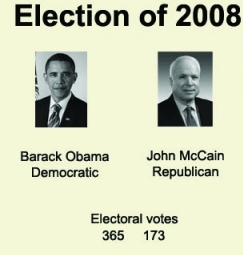
2008 – Senator Barack Obama of Illinois defeated Senator John McCain of Arizona to become the 44th U.S. president, and the first African-American elected to the White House.
More than 69.4 million Americans cast their vote for Obama, while 59.9 million voters chose McCain, a war veteran who emphasized his considerable legislative experience and knowledge of world politics.
Obama benefited from being able to blame the Republican Party for an economy that was heading into recession.
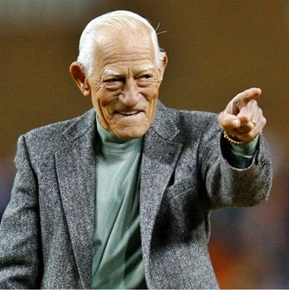
2010 – Baseball Hall of Fame manager George Lee “Sparky” Anderson, the first manager to win the World Series in both leagues (Cincinnati and Detroit) died of complications from dementia. He was 76.
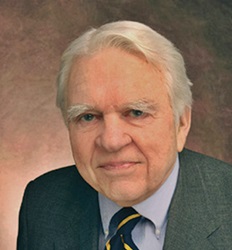
2011 – Andy Rooney died after developing postoperative complications from surgery. His death at 92 came less than five weeks after he had retired.
Rooney first found fame as a field correspondent for Stars And Stripes during World War II, but became best known for his weekly broadcast “A Few Minutes with Andy Rooney” as part of 60 Minutes
Compiled by Ray Lemire ©2018 RayLemire.com / Streamingoldies.com. All Rights Reserved.